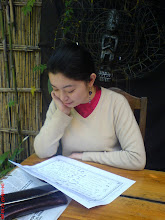Friday, March 21, 2008
notes to the draft
Bear with me, an experiment-- perhaps just to help me propel and fly-- and finally have in my hands, three papers due very very soon. . .
From the introduction to PHilippine Criticism:
J. Neil Garcia: ". . . literature's boundaries are immensely permeable to whatever surrounds it.
Abad's training in UP: American New Criticism which focused on the formal perfection of the poem as a "verbal icon." This new critical mode with its stress on organic unity, emotional restraint, and metaphor, irony,a nd ambiguity, shaped the poetic sensibility from the 50's and 60's with the earlier Romantics. . ." but after exemplars of particular poetry from Angeles and Maramag, he goes on to say that from poet to poet, "each one who persevered int he craft constantly achieves through metamorphosis of his idiom and subject a full individual voice." Each one's poetic career shows accretion and maturation:
Nick Joaquin, Bienvenido Santos, Edith Tiempo, Cirilo Bautista
- show that the poet constantly makes new discoveries in his own field of vision (his own distinctive sbuject matter) and transforms his mode of expression conformably to them. . . thus, whatever be the poetic influences in his work or the regnant critical theory of his time, the work of imagination is achieved chiefly by the poet's own solitary labor, that is, the long creative struggle to forge from one's medium (say, English) a language to discover and express one's subject.
Isagani Cruz's "The Other Other: Towards a Post Colonial Peotics"
Aha! So for Philippine literature, its undertheorization is due to this: "[a] stem[ming] from the internalization of a hegemonic universalization of culturally imperialistic, pre- or anti-theoretical quasi-formalistic, mechanically reflectionist, white patriarchy!
"I submit that the inequitable distributuion of critical wealth can be traced to, among other things, colonialism, orientalism, and hegemony."
Subscribe to:
Post Comments (Atom)


No comments:
Post a Comment